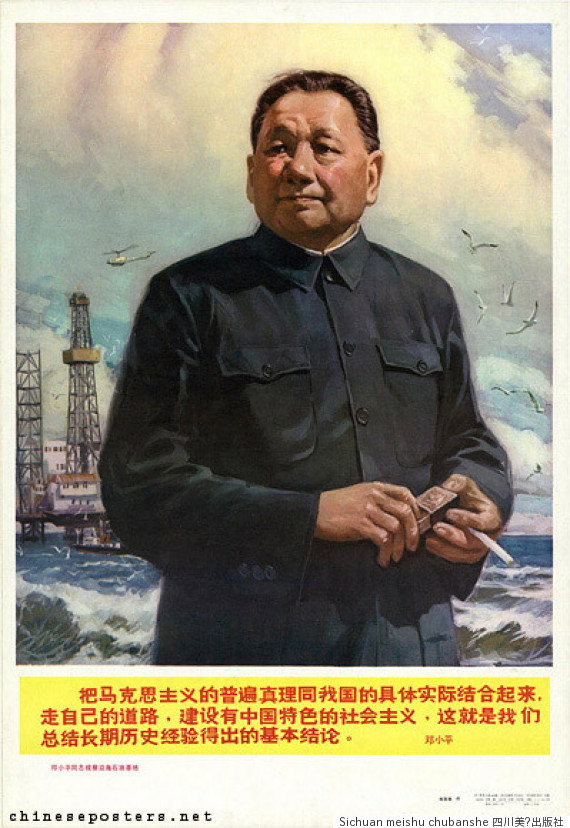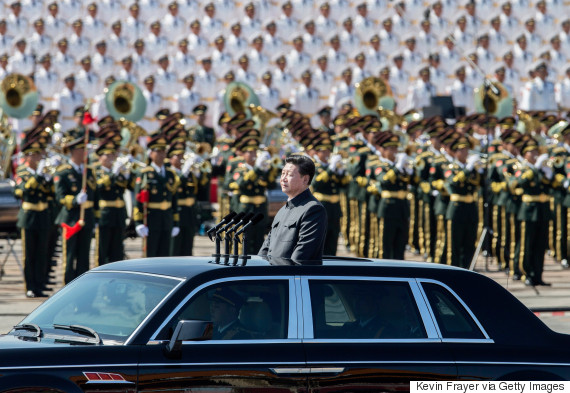Nathan Gardels is the editor-in-chief of Noema Magazine.
Earlier this month, several Chinese lawyers were convicted of “subversion” for colluding with “foreign forces” — read: the United States. The fear is that America’s aim is to ultimately foment regime change in Beijing with a popular uprising, like the “color revolution” in Ukraine and those of the Arab Spring. In what most regard as forced performances, some of the accused even confessed on TV that their legal challenges to the state were opening the doors to the deleterious influence of Western ideas. The Communist Party leadership also sees the promotion of Western-style practices, such as multi-party elections or an independent judiciary, as designed to undermine their rule through a creeping peaceful evolution that will inexorably result in turmoil.
To hammer home that message, China’s chief prosecutor’s office, the Supreme People’s Procuratorate, released a video in tandem with the trials showing the chaos, violence and instability across the world where the West has sought to promote democracy, conveying to Chinese viewers (English subtitles provided by the South China Morning Post) that the stability they enjoy is due to China’s one-party system. It is likely such a video was well received. According to a recent Pew Survey, 79 percent of Chinese polled believe their way of life must be protected against “foreign influence.”
Regime change or fomenting a “color revolution” in China is not an active U.S. policy, as some top ranks of power in Beijing clearly seem to think. But there is nonetheless an ideological expectation among America’s political class that China’s governing system is “on the wrong side of history,” as former U.S. President Bill Clinton once put it, and so destined to fail. And, in the minds of China’s leaders, that no doubt amounts to the same thing.
Former Australian Prime Minister Kevin Rudd has cited this issue as a perennial obstacle in relations between the world’s two largest economies. The Chinese have concluded, he wrote in a report for the Belfer Center at Harvard, “that the United States has not, and never will, accept the fundamental political legitimacy of the Chinese administration because it is not a liberal democracy.” Fu Ying, the powerful chair of the Foreign Affairs Committee of the National People’s Congress, confirms this point from the Chinese side. “The West will never accept that we are reforming until we have a [Mikhail] Gorbachev,” she told me in Beijing last year, referring to the last leader of the Soviet Union.
No leading American politician today would risk publicly acknowledging that China’s system of governance — despite pronounced flaws like democracy itself — is not only legitimate but admirable in its “encompassing” aspects, notably its capacity over the last 30 years to reduce massive poverty and lift general living standards.
There is an ideological expectation among America’s political class that China’s governing system is ‘on the wrong side of history.’
This issue of political legitimacy thus always shades the background of every other dimension of U.S.-China relations. Absent acknowledgement of a “symmetry of validity” that changes the narrative, a Cold War taste will continue to sour the idea of any new relationship in the times ahead. It holds back any fuller embrace and raises suspicions over every initiative. Fearing subversion of their system, the Chinese crack down on lawyers and human rights activists. That, in turn, only reinforces Western perceptions that China’s system is inevitably repressive and must be challenged.
As long as the Chinese see a threat, they will continue to inveigh against “Western values,” further fueling the destructive cycle of this symbiotic antagonism. The Chinese would less defensively accept criticism — for example, that censorship impedes the “seek-truth-from-facts” pragmatism that has guided reform efforts since Deng Xiaoping — if it is rooted in a basic recognition of legitimacy. It would then not be seen as a ruse or plot to overturn their system of governance.
Europeans, after all, regularly criticize America’s gun rights, urban racial strife and high prison population. Americans regularly criticize Europe’s inability to assimilate immigrants. These criticisms are always annoying to those on the receiving end but are taken in stride because they are not seen as assaults on the foundations of each other’s political systems.
 Deng Xiaoping inspects a coastal oil base, 1985. (Sichuan Meishu Chubanshe)
Deng Xiaoping inspects a coastal oil base, 1985. (Sichuan Meishu Chubanshe)
Leninist Crackdown or Confucian Governance?
Is the current crackdown on so-called “civil society” in China nothing more than a Leninist impulse to crush any opposition so the corrupt nomenklatura, as in the old Soviet Union, can maintain the perks and privileges of power at the expense of the people? Chinese President Xi Jinping’s protracted anti-corruption campaign, including against powerful party officials, suggests otherwise.
Rather, it seems something more profound is at work, something rooted in China’s historical conception of the respective roles of the central state, society and the individual in governance that has sustained continuous rule for millennia. To understand the historical resonances of what scholar Pan Wei calls China’s “institutional civilization“ is not to justify or absolve repression. But it is to dispel the self-righteous illusion that change can be imposed from outside the organic evolution within a given society.
It took decades of emotional debate around family tables, in the media, the churches and legislatures for liberal American culture to even entertain the idea of transgender bathrooms, which the Obama administration has now instructed all public schools to include. Will modern China and other far less liberal societies who have not gone through that experience now be accused of human rights violations if they don’t immediately follow suit? The Western values of a free civil society are not for everyone, and even if they are considered universal, historical development doesn’t proceed everywhere at the same pace or along the same tracks. Change only establishes itself if owned by those who make it.
In 2015, 77 percent of Chinese polled said they are better off now than five years ago.
Because the party delivered a better life for most Chinese over recent decades, it has attracted, by all accounts of even Western pollsters, the allegiance of most of its population — far from fertile ground for revolt by a discontented public. A Pew study in 2013 showed that more than 80 percent of Chinese polled said their country was headed in the right direction. In the poll, only 31 percent of Americans felt the same way about their country’s trajectory. A 2015 poll also found that 77 percent of Chinese surveyed said they are better off than five years ago, despite major concerns about official corruption and pollution. These numbers suggest that, for now at least, China’s Communist Party has achieved what the Italian political theorist from the turn of the 20th century, Antonio Gramsci, called “ideological hegemony.”
Long before Harvard’s Joe Nye came up with the idea of “soft power” vs. “hard power,” Gramsci made a similar distinction between two different kinds of dominant power, or hegemony. For Gramsci, hegemony of the state is based on force, or hard power; the state must establish a monopoly over the means of violence in a society in order to impose and maintain order. But hegemony in civil society — hearts and minds — must be based on consent. For Gramsci, the allegiance to a worldview by the public at large must be earned and cannot be enforced. The public must buy into a governing narrative voluntarily or that narrative, by definition, lacks legitimacy. For Gramsci, it is soft power that legitimates hard power, not vice versa. Gramsci saw his Italian Communist Party as part of civil society, not the state. State power could only be held, in his view, once civil society was convincingly won over to the party’s narrative.
In China, the party-state has merged these two forms of hegemony, opening the way to blurring force and consent in maintaining power. If the party authorities feel insecure that consent may wane as the economy slows, they are more than ready to deploy the hard power of police and prosecutions to enforce allegiance upon any “manufacturers of chaos” who seek to light a larger fire of discord.
The division between civil society and the state has never had the same grounding in China as in the West.
In an important way, the division between civil society and the state has never had the same grounding in China as in the West because China never experienced the historical contest between religious and political authority, which carved out separate realms of power. Though some have argued there was a kind of feudal pluralism that constituted rival power centers in China, the mainstream view is that China has always had a unitary state that encompassed all of society with no distinct realm beyond its fold.
For this reason, China’s governing philosophy has also never developed the notion of an institutional separation of powers. Even the Qin dynasty (221-206 B.C.E.) “Legalist School” of philosophy — which is said to be President Xi’s primary inspiration in his anti-corruption campaign — was meant to reinforce the administrative power of the unitary state. “Rule by law” is not meant to give the individual a way to redress abuses of power through the appeal to an independent judiciary as “rule of law” would do, but to ensure that rulers and citizens alike obey the laws set down by the state when their Confucian personal ethical fortitude falters.
In an effort to prevent any counter-hegemony or competing narrative from arising, the party-state in China has followed this inherited view from tradition and sought to limit any chance of an independent civil society or an independent judiciary from emerging (though recent reforms have set up county-level courts so they are free from the influence of corrupt local party bosses).
 Chinese President Xi Jinping rides in an open top car in front of Tiananmen Square and the Forbidden City during a military parade, marking the 70th anniversary of the end of World War II, on Sept. 3, 2015 in Beijing. (Kevin Frayer/Getty)
Chinese President Xi Jinping rides in an open top car in front of Tiananmen Square and the Forbidden City during a military parade, marking the 70th anniversary of the end of World War II, on Sept. 3, 2015 in Beijing. (Kevin Frayer/Getty)
In doing so, the party-state has at the same time created a kind of systemic accountability to the public despite the lack of autonomy of civil life outside state control. As the Singapore-based scholar Zheng Yongnian points out, the development of a civil sphere, such as it is, in China is a “dual process of legitimation and domination” that has mutually transformed both the party and civil society. By “taking into account the interests of other social forces and linking them with its own,” Zheng writes, the party itself has, necessarily, been “self-transformed.”
Unlike in the West where consent grants legitimacy, in the traditional Confucian perspective, legitimacy is granted by the virtue of the ruler who is bound in a reciprocal relationship with his subjects to serve their needs if obedience is expected. In the Analects, Confucius lays out the mutual obligations of a virtuous hierarchical order: “If a man is correct in his own person, then there will be obedience without orders being given. But if he is not correct in his own person, there will not be obedience even though orders are given.”
Policies change but the party, like the emperor system before it, doesn’t.
This dynamic of responsiveness to maintain legitimacy is the core of the “adaptive authoritarianism” and “inclusive hegemony” which has enabled the party to survive through pragmatic accommodation of policies to changing realities. Policies change but the party, like the emperor system before it, doesn’t. The party has continuously morphed from a peasant organization dominated by Chairman Mao Zedong at its founding into a broad social tent that today has more than 80 million members, including even billionaires professing Buddhism.
The result is a kind of “fuzzy” power where there is a mutual dependence between the party-state and the people. The party-state is a utility shaped by its users. Its usefulness derives from its capacity to deliver the goods and respond to social concerns. If it can’t, consent will erode and the ideological hegemony that cements the party’s power will come unglued.
The “fuzzy” parameters are constantly shifting since the red lines that can’t be crossed are defined by a constantly floating balance of power within society. Thus, the artist Ai Weiwei is one day proudly provided with the necessary permits to build a studio — which is later bulldozed by the same authorities. One day, he is jailed and beaten, then put under house arrest and his passport taken away. Later, he is given back his passport and allowed to exhibit his decidedly political art in high-profile exhibitions in Europe. In March 2015, a privately produced video criticizing China’s unlivable pollution was allowed to go viral on Youku, China’s version of YouTube. Once it became “too viral,” it was censored because the authorities began to realize they would be as much blamed for a ruinous environment as credited with trying to clean it up.
The Belated Birth of Civil Society in China
A clarification of this fuzziness in China’s system of power may be in the works as an autonomous sphere for civil society of the kind associated with the West is emerging. The system, which has managed to balance stability and change for so long, is being challenged as never before.
What is different for China now than during its more than 2,000 years of institutional civilization is the intrusion of the information age, where all share the same access to information as their rulers. And it is here that the guiding anxiety of China’s top party officials, who are determined not to succumb to the fate of the Soviet Communist Party, appears misplaced. They are laboring under the power of the wrong metaphor.
As Xi and his colleagues see it, the Soviet party met its demise because of Gorbachev’s policy of “glasnost,” or transparent information. They have thus concluded the way to survive is to construct a narrative people are compelled to believe in by controlling what they are otherwise allowed to know. The reality is that the Soviet party collapsed precisely because of a similar effort to disguise reality with a narrative that didn’t square with the overall facts. When the lies were taken away under “glasnost,” there was nothing there.
Whether China ends up on the wrong side of history or not depends on its ability to find a new balance between rule from the top and an emergent civil society from below.
The Chinese party could not be more different. In China, the emperor does have clothes. It has demonstrably delivered for its people over the last three decades precisely by following the pragmatic dictum of “seeking truth from facts” instead of spinning reality. Admitting mistakes — brought to their attention by the activists and social media of a fledging civil society — and fixing them, not covering them up, is what establishes legitimacy in the information age when everyone knows what’s what anyway. The old system of hierarchical control that could once impose an authoritative narrative is doomed by the democratization of information.
Just as the bourgeoisie created the space for civil society vis-à-vis royal absolutism in Europe, and just as women are today the makers of a democratic public sphere vis-à-vis theocracy and patriarchy in the Islamic world, so, too, social networks and media are the makers of civil society in today’s China.
This is a new and unprecedented development for such an old civilization. Whether China ends up on the wrong side of history or not depends on its ability to find a balance between rule from the top and an emergent civil society from below. We in the West should encourage China’s effort to forge a new equilibrium out of its own experience, not seek to project our legacy onto their future.
Note: Parts of this essay have appeared in a different form elsewhere.
Related on WorldPost:





